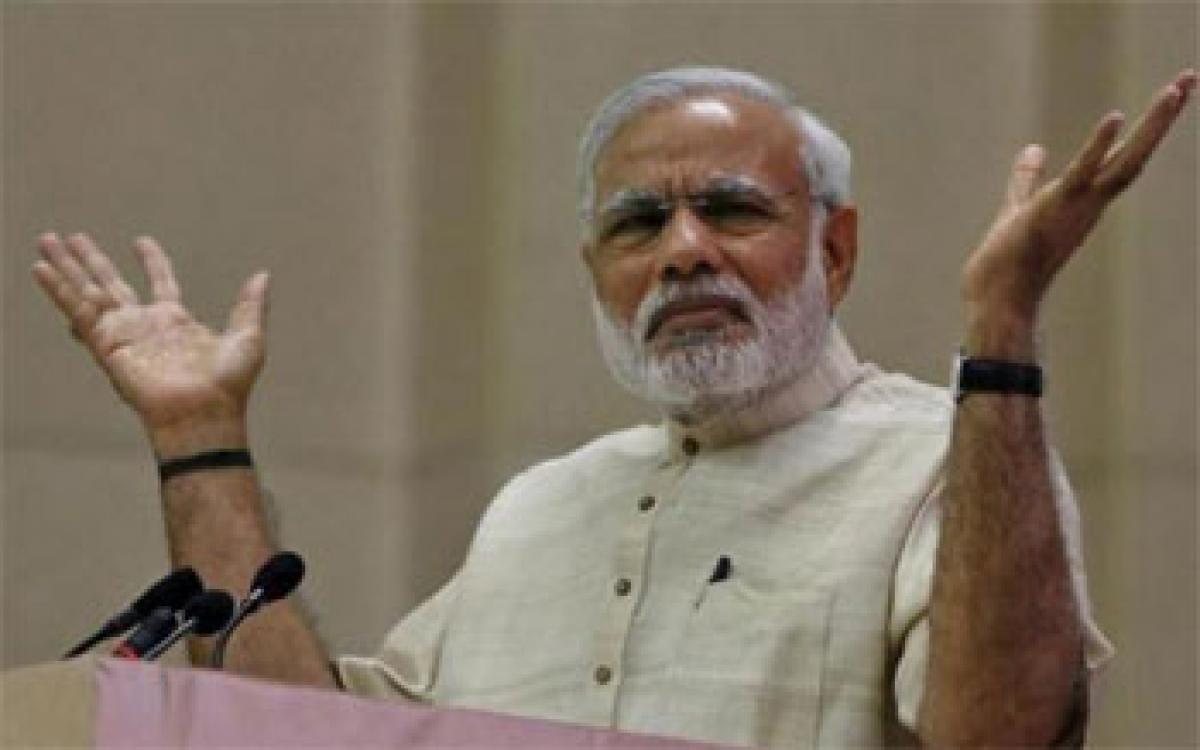Live
- Over 7,600 Syrians return from Turkiye in five days after Assad's downfall: minister
- Delhi BJP leaders stay overnight in 1,194 slum clusters
- Keerthy Suresh and Anthony Thattil Tie the Knot in a Christian Ceremony
- AAP, BJP making false promises to slum dwellers for votes: Delhi Congress
- 'Vere Level Office' Review: A Refreshing Take on Corporate Life with Humor and Heart
- Libya's oil company declares force majeure at key refinery following clashes
- Illegal Rohingyas: BJP seeks Assembly session to implement NRC in Delhi
- Philippines orders full evacuation amid possible volcanic re-eruption
- Government Prioritizes Welfare of the Poor, says Dola Sri Bala Veeranjaneyaswamy
- Two Russian oil tankers with 29 on board damaged due to bad weather
Just In

Prime Minister Narendra Modi is personally taking on notorious red tape to clear tens of billions of dollars worth of stalled public projects, hoping that his hands-on intervention can bend a vast, dysfunctional bureaucracy.
.jpg) New Delhi: Prime Minister Narendra Modi is personally taking on notorious red tape to clear tens of billions of dollars worth of stalled public projects, hoping that his hands-on intervention can bend a vast, dysfunctional bureaucracy.
New Delhi: Prime Minister Narendra Modi is personally taking on notorious red tape to clear tens of billions of dollars worth of stalled public projects, hoping that his hands-on intervention can bend a vast, dysfunctional bureaucracy.
Once a month, Modi holds a meeting with top state and Central bureaucrats to check why projects have not got off the ground. Since March this year, his intervention has helped revive nearly $60 billion in Central and state projects, according to government data through September seen by Reuters.
Modi has won plaudits for the initiative that has chipped away a ($150 billion) backlog of planned roads, ports, railways, power stations and other projects. But equally, critics say, the fact he needs to personally intervene shows the level of government inertia in Asia's third-biggest economy.
"It is a systemic problem that the prime minister needs to work on," said Arun Maira, a management consultant and member of the previous Congress government.
The initiative, launched by Modi in March and publicised on his personal web site and Twitter feed, is called pro-active governance and timely implementation, or PRAGATI, which means "progress" in the Hindi language.
Central and state bureaucrats are linked by video to Modi's office for the meeting, usually held on the fourth Wednesday of each month.
They are typically from the finance, law, land, environment, transport and energy ministries whose clearances are needed for many projects.
The agenda is set the previous week and usually has about a dozen stalled projects, public grievances and other governance issues.
A senior official who has attended said that when a project comes up for discussion, Modi turns to the representative of the ministry where it is being held up.
He simply asks, "Please tell me why it hasn't happened," the official said. Several months into PRAGATI, the official said, a majority of the projects are cleared before they come up for discussion.
The proposed 4000 MW power station by NTPC in Telangana as per the AP Reorganisation Act has also received the coal linkage after the project was included in the PRAGATI scheme. Earlier Chief Minister K Chandrashekar Rao has written four letters to the Centre but the linkage was not given.
UP Chief Minister Akhilesh Yadav, a political rival of Modi, wrote to the Prime Minister's Office requesting the inclusion of a $1 billion metro rail project in the state capital at one PRAGATI meeting. It got the clearances, including a pledge of federal funding, at the September meeting. "This is a welcome move which would go a long way in doing away with avoidable delays," said Alok Ranjan, the state's top bureaucrat.
Still, critics say that while Modi can quickly cut through red tape, his style centralizes decision-making and will not be sustainable in a country as large as India. The stock of stalled projects in the country has come down, but remains high.
In the July-September quarter, projects worth 7.6 percent of India's GDP, or $152 billion, were stalled, down from a peak of 8.5 percent in the January-March 2014 quarter, according to CMIE, a think-tank. The data includes private investment plans.
"Running a country is far more challenging than managing a state," said Maira, the consultant, referring to Modi's reputation as an effective administrator when he was Chief Minister of Gujarat state from 2001 to 2014. During those years, he used a similar initiative to get projects off the ground.
After taking over as Prime Minister last year, Modi vowed to fire up notoriously slow bureaucracy. He has set an ambitious goal of making India one of 50 most business-friendly destinations in the world by 2017.
The World Bank ranked India 130th out of 189 economies, up from 134th last year, in its annual Doing Business report released this week.
The previous government set up a cabinet task force to clear the backlog of projects but failed to make much of an impact because state governments were not involved. Modi's initiative has tried to plug that loophole.
AP Chief Secretary IYR Krishna Rao said projects are usually held up by a lack of coordination between different departments and governments.
Rao said he was pushing to get clearances for a railway line in his state. After it was reviewed by Modi, the response from the railway ministry improved substantially. "This is a very good forum," Rao said.

© 2024 Hyderabad Media House Limited/The Hans India. All rights reserved. Powered by hocalwire.com







